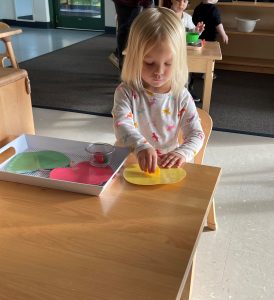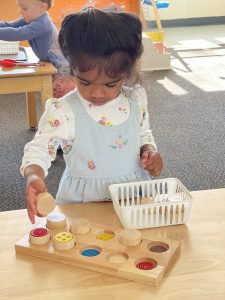In our Beginner’s classrooms, there is so much amazing growth and development going on every day. I spent time this week visiting both of the Beginner’s classrooms. For these children, ages 18 months up to three years, it is truly a wonder to see how much they are growing–cognitively, socially, and emotionally–in this carefully prepared environment.
Children are developing their cognitive powers through direct experience — seeing, hearing, tasting, touching, movement. They are literally absorbing and internalizing their experiences. In addition to finding joy through experience and self-direction, children are also discovering the power of mastery through repetition, essential for life-long learning.
Here are some of the things that stood out to me most during my visits this week:
 Respect is encouraged
Respect is encouraged
Teachers speak with respect. They role-model please and thank you, speak slowly, use a quiet voice, and keep directions simple and to a minimum in order to focus on clarity. With the goal of allowing children to develop their own agency, the teachers mostly observe the children, providing coaching and direction only when needed, emphasizing that it is best to nurture a child’s independence.
Children show their independence
After a lesson on how to use the materials, students mostly work independently, without teacher interference. Teachers provide gentle guidance to support each child, as needed. The physical environment is neat, well organized, and prepared with the right materials for each child to explore easily within reach. Children learn from mistakes and self-correct without having to ask for help from their teacher. And children also learn by observing their peers.
Student concentration is strengthened
The materials naturally draw in the child and become the focus of work. The materials are attractive and pleasant to manipulate. Because of this, concentration is not distracted by other things happening in the room. There are an appropriate number of options (for both large-motor and small-motor development) to explore an interest without being overwhelmed. And the learning is relevant for the child — making food, managing familiar, real-world tasks like sweeping, washing windows, watering plants, pouring, transferring objects from one container to another, manipulating fasteners, hanging a coat on a hook and keeping their own cubby space neat.
Repetition builds mastery
The materials in the classroom naturally encourage repetition until mastery of the material is achieved and can be done easily. When repetition is not occurring, it may not be the right material for that moment and a child may need to come back when the concept is better understood. Teachers also observe each child carefully to make sure that each child is being appropriately challenged. Teachers use repetition when explaining the material, and repeat words and names frequently. Children are also encouraged to repeat these verbal instructions as a way of making this learning more memorable and visible.
 One child has selected a material that has round wooden pieces about an inch in diameter. Each piece has a completely different texture and color, and fits exactly onto a board that also has the same shape, texture, and color. “Would you like a lesson?” asks the teacher. The boy nods. The teacher takes each shape and helps the child put his finger on the shape to feel the texture. “What does that feel like?” “Bumpy,” says the boy. “Let’s feel the board. Where does it feel the same?” The child explores the board and finds the space with the same bumpy texture. “Here,” says the boy. “Yes, let’s put it here,” says the teacher. “Let’s select another shape,” the teacher says. After helping the child with a few shapes the teacher says, “why don’t you do this work on your own.” After the boy has finished the material, the teacher asks, “would you like to do this again or select another work to do?”
One child has selected a material that has round wooden pieces about an inch in diameter. Each piece has a completely different texture and color, and fits exactly onto a board that also has the same shape, texture, and color. “Would you like a lesson?” asks the teacher. The boy nods. The teacher takes each shape and helps the child put his finger on the shape to feel the texture. “What does that feel like?” “Bumpy,” says the boy. “Let’s feel the board. Where does it feel the same?” The child explores the board and finds the space with the same bumpy texture. “Here,” says the boy. “Yes, let’s put it here,” says the teacher. “Let’s select another shape,” the teacher says. After helping the child with a few shapes the teacher says, “why don’t you do this work on your own.” After the boy has finished the material, the teacher asks, “would you like to do this again or select another work to do?”
Following my classroom visit, one of the teachers shared the following with me: “In a toddler classroom we always set clear and appropriate expectations for the children. When giving a child feedback we always try to tell them what to do instead of what not to do.” Another teacher shares with me, “It is really amazing to see how much each child has grown already within the first month of school.”





